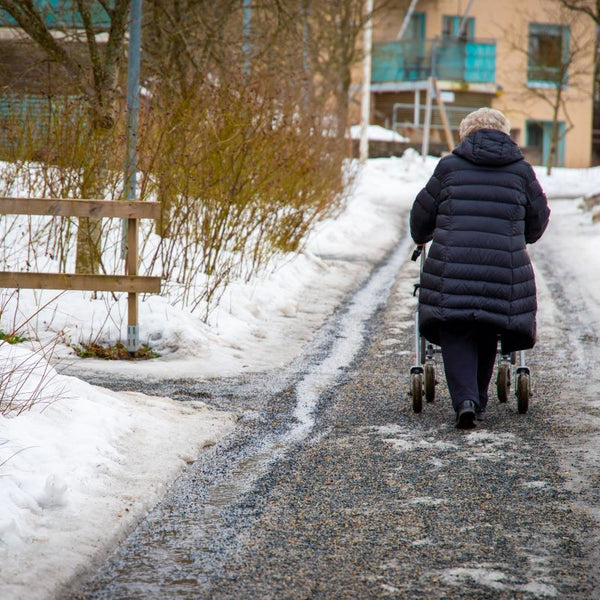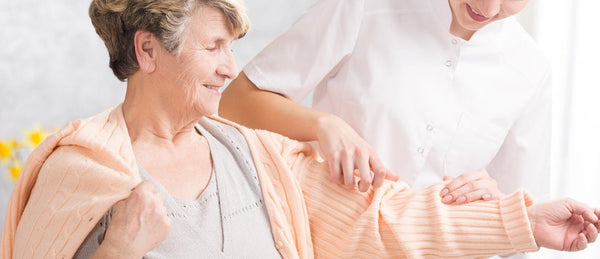As parents get older, sometimes the dynamic within a family changes, and the elderly parent needs more support than they used to.
This can be challenging for everyone, especially if your parent lives very independently, and some care needs to be taken when talking about potential needs or help at home to find the best way of moving forward. With the right support, many aging parents can enjoy a great quality of life in their own home for longer.
In this article, we provide a checklist of considerations for relatives looking into care options for their aging parent(s).
Jump to:
- Involve your parent in the discussions
- Assess your older parent’s needs and what they need some support with
- Consider what support you can offer personally
- Look at how to help elderly parents from a distance
- Look into caring for elderly parents and getting paid in the UK
- Look into paying for elderly care and any other benefits
- Arrange professional care for your elderly parent
- Consider what else could provide peace of mind?
Involve your parent in the discussions
Your parent is the one that’s living with the situation, so they’re often best placed to know what support they need as they get older. It isn’t always the case though; your parent might not want to acknowledge that things are changing for them, or they could be fearful about what it might mean for the independent life they currently have.
Take a look at these tips for talking to elderly parents about care needs for some ideas about how to broach the subject with them and start discussing areas that might need to change a little.
Having conversations about this as early as possible can help.
It might be that your aging parent has absolutely no requirement for support right now, but you want to explore what their wishes would be if things do change in the future.
The earlier that you start talking about this, the more that many older people are accepting of some extra support, because they’ll understand that it’ll help them stay more safely in their own home for longer.
Assess your older parent’s needs and what they could need some support with
There may have been something that has sparked some changes in your elderly parent, such as a fall, an accident at home or a medical condition worsening.
It can feel like a bit of a mountain to climb, but a good way to assess what help they might need is to note down every single thing or task they usually do during a day, a week and a month and jot down everything that they now perhaps find harder or could do with some assistance with.
It will probably take a while to make this list, a few weeks usually, but it will help provide a much better picture of their needs and what support they are likely to require to live a full life.

Consider what support you can offer personally
If you live locally to your parent, then it might be that you can take on some caring responsibilities yourself.
This could mean just popping in more frequently than previously to check in or helping with some meals or housework; although you will have to consider your other responsibilities and how it all fits together, such as work commitments and other family members.
It may be worth assessing whether you can afford to pay for some private care or not, for the times that you can’t be there in person or if you know that your parent would prefer for someone else to help support them rather than a family member.
It’s important to be realistic with the help that you can sustainably offer personally, because carers need care too.
Look at how to help elderly parents from a distance
If you don’t live nearby or there is another reason why you can’t offer much support to your elderly parent personally, it’s worth looking at how you can help from a distance.
This could include things such as:
- Arranging care for them from someone else
- Making a rota for family members to visit
- Look into choosing a personal alarm so that you know there will be help if needed, 24/7
- Look into home monitoring devices that can raise an alert if anything unexpected happens in your parent’s home
Looking into caring for elderly parents and getting paid in the UK
If you, or another family member, is able to do much of the caring in person, there may be some financial help available from the government. Find out more about the eligibility criteria and how to claim carers allowance.
Caring for elderly parents yourself can be very rewarding but it’s also hard work - so it’s important that you don’t burn out and can manage things on an ongoing basis.
Look into paying for elderly care and any other benefits
There might be various options to pay for your elderly parents’ care, depending on whether they can afford to pay for it, whether you can, or whether they qualify for social care assistance.
Your parent’s local authority has a duty of care to provide financial assistance if your parent’s income or assets don’t meet a certain threshold. However, this can be confusing because the threshold can depend on where you live and it’s likely that even with this support, additional payments will be needed. Find out more about eligibility for financial help with elderly care and self-funding.
In addition to carers allowance for the person doing the caring, other potential benefits for the aging parent might include attendance allowance, depending on the mobility needs involved.

Arranging professional care for your elderly parent
If you decide that some outside help is needed for your older parent, there are lots of considerations to look at.
- Are you going to use a care agency?
- How do you know whether the quality of care provided is what you’d expect?
- Is there flexibility for the carer and their schedule to fit in with your parent’s usual activities to help ensure they carry on enjoying the things they like to do?
Take a look at questions you should ask when choosing care.

Consider what else could provide peace of mind
If you can’t be with your aging parent all of the time and are worried about them when they are alone, one option to consider could be a fall alarm, that automatically detects if the wearer has a fall and raises an alert with the emergency response team.
An emergency alarm for the elderly with a panic button could also be a good option if you and your parent would appreciate the reassurance that help is always on hand if needed.
Choosing a personal alarm
You can view Taking Care’s full range of products and services to choose the best personal alarm for both yours and your parents needs.




